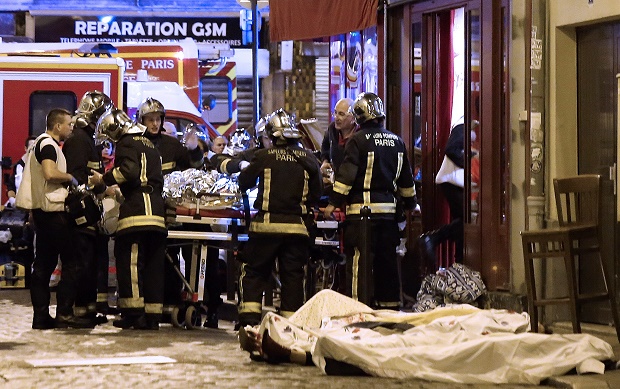Paris Light

Rescue workers gather at victims in the 10th district of Paris, Friday, Nov. 13, 2015. Several dozen people were killed in a series of unprecedented attacks around Paris on Friday, French President Francois Hollande said, announcing that he was closing the country’s borders and declaring a state of emergency. (AP Photo/Jacques Brinon)
The words of a survivor of the brutal attack on the Bataclan concert hall in Paris describe the horror in nausea-inducing detail. “It looked like an abattoir. I was wading through blood. It was a centimeter deep in places. I had to clamber over dead bodies to get out,” Michael O’Connor told the BBC.
That image of a concert venue turned slaughterhouse on Friday, Nov. 13, in the storied capital of France, captures the random carnage that was the primary objective of the terrorists. It could only have been terrorism—the concept of asymmetrical warfare is only analytical, the framework of an anti-Western backlash mostly rhetorical. Above all, the declaration of an Islamic holy struggle is a perversion of religion.
What the terrorists did last Friday was to kill innocent people precisely for their innocence: a passerby who just happened to be outside the stadium where a football game was being played, diners who just happened to choose a Cambodian restaurant or a pizzeria, revellers who just happened to meet for drinks at the bar, concert-goers who just happened to buy tickets to a sold-out gig. What did they have in common? Nothing, but their innocence.
The Islamic State has claimed the acts of terror as its own. But whatever the IS is, it is neither Islamic nor a state. The most authoritative voices in Islam have condemned its tactics, precisely as a repudiation of the religion it purports to serve. Indeed, the IS has claimed many more victims from Islam than from any other creed. There is nothing Islamic, then, in last Friday’s savagery.
The coordinated attacks, apparently conducted by three teams of terrorists, were aimed not at military targets or even at a particular nationality, but at ordinary people, doing ordinary things, on an ordinary evening. That is why the lists of the dead and the wounded include victims from many nations, people of different races, adherents of different faiths (yes, including Islam).
The randomness of the carnage was part of the plan.
There was apparently one team of attackers who rode a black-colored car called a Seat, and cruised for victims in two city districts: They fired on a bar called Le Carillon and a restaurant called Little Cambodia (where 15 victims died); then about seven minutes later, attacked Cafe Bonne Biere and the La Casa Nostra pizzeria (where five people died); then about four minutes after that, sprayed the bar La Belle Equipe (where 19 died).
A second team of three terrorists claimed the biggest number of victims, when they barged into the packed Bataclan concert hall (maximum capacity: 1,500) and killed 89 mostly young concert-goers. At least 99 others needed to be brought to hospital.
The third team, which was the first to strike, could have done the most damage. Three terrorists wearing identical explosive vests tried to enter the Stade de France, where France was hosting a friendly with Germany. An alert security guard (a Muslim, as it happens) prevented the first terrorist from entering; the man then stepped back and detonated the explosives, killing himself and a passerby. The two other suicide bombers also killed themselves outside the stadium.
If they had not been stopped by routine security checks, the impact could have been catastrophic.
But all told, the acts of criminal terror claimed the lives of 129 innocents and injured over 300; it was the worst surge of violence in the city since the end of World War II. It shocked Paris and stunned the rest of the world—not because the victims were richer or more “white” (as one meme had it) or were non-Muslim (all false), but because Paris is one of the most familiar places on earth. For several years running, measured according to international tourist arrivals, France has been the most visited country in the world. And for even longer, Paris has been among the Top 5 most visited cities on the planet.
For the same reason that Hollywood disaster movies almost always show asteroids or aliens destroying New York City or Tokyo or London or, yes, Paris, the IS terrorists knew that attacking a city filled with iconic landmarks instantly recognizable to billions of people was good tactics. What they did not know is that it was also, in the long run, a losing strategy. Their savagery may attract a few recruits, but it also mobilized millions of Parisians, around the world.















